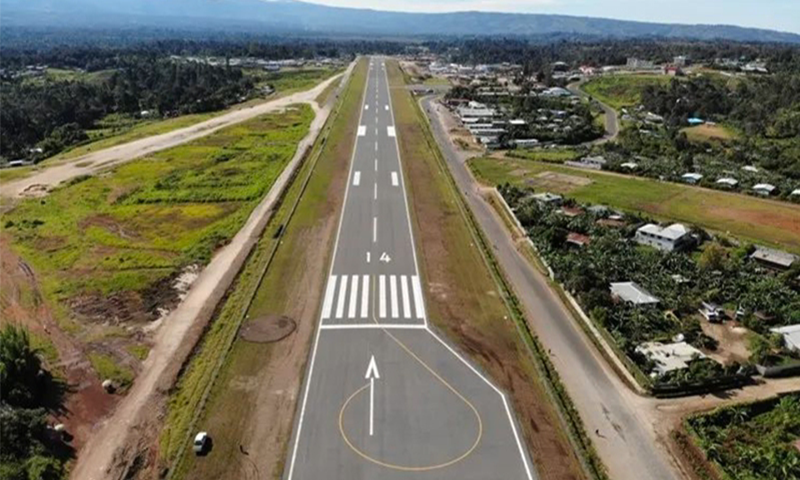
China Civil Engineering Construction Corporation South Pacific Ltd. base in Papua New Guinea hands over the re-constructed Tari Airport to the government of PNG on September 16, 2020. Photo: CCECC
A senior US State Department official's call for Papua New Guinea (PNG) to reject a potential security agreement with China reflects the hegemonic mindset of the US in the region. Chinese experts said on Monday that the accusations are completely groundless, and slammed the US actions of smearing China as "disgraceful."
"We've seen that the Chinese commitment in defense or investment comes with a high cost. That's what we'd say to PNG," United States Deputy Secretary of State Richard Verma said in an interview with the Sydney Morning Herald.
The Papua New Guinea government is mulling a potential security deal, according to its Foreign Minister Justin Tkachenko, Reuters reported.
Accusing and smear China based on how oneself handles relations with South Pacific countries is disgraceful, Chen Hong, director of the Australian Studies Centre of East China Normal University, told the Global Times on Monday.
While claiming to provide assistance to regional countries, the US has actually been militarizing the area, noted the expert, saying that the US meanwhile has spared no efforts in smearing China. Papua New Guinea has indeed paid the price for its relationship with the US, including compromising its sovereignty. The "debt trap" narrative fabricated by the US has turned out to be an absolute lie, Chen said.
The cooperation deal in policing between China and Papua New Guinea comes out of practical needs, Chen highlighted. He said that the country has been suffering from insufficient police forces in the country during emergencies, which is a result left over from the colonial era.
Western powers colonized these regions without properly establishing a system of social governance and left them in a mess in terms of politics, economy, and social governance when the regional countries gained independence, the expert noted.
Papua New Guinea's mulling of the cooperation deal with China in policing field shows that it attaches great importance to sustaining economic and business cooperation with China. Some Chinese enterprises and businesses were also victims during recent riots and violence in the capital, where a state of emergency was declared, Chen told the Global Times.
In January, the Chinese embassy had lodged a stern representations with the PNG authorities regarding the attacks on Chinese businesses, requiring effective measures from PNG to ensure the safety of Chinese nationals and business establishments and severe punishment for the attackers.
Experts also pointed out that, like the cooperation between China and the Solomon Islands, the cooperation agreement with PNG will also assist the country in initiating economic growth, achieving political stability, and improving the overall welfare of its people. The law enforcement cooperation aims to preserve the progress made in the country's development.
PNG has previously said Australia and the US were its security partners, while China was an important economic partner, Reuters reported.
Yu Lei, chief research fellow at the Research Center for Pacific Island Countries of Liaocheng University, noted that the so-called issue of security was frequently used by the US to coerce Pacific Island countries.
To a certain extent, the Papua New Guinea government has to consider the possibility of the US and its allies creating chaos, destruction, subversion, and even military intervention in the country, Yu added.
The unspoken rule, based on the hegemony of the US and other former colonial powers, is that the US acts as the regional sheriff in the area, with Australia serving as the deputy. The other former colonial powers function as the police, while the island countries are subject to their economic exploitation and political manipulation, Yu explained.




